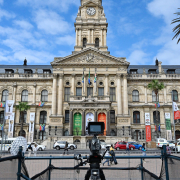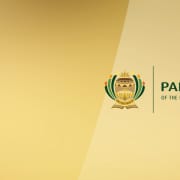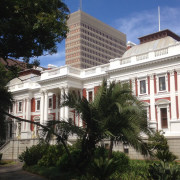|
Getting your Trinity Audio player ready...
|
Parliament has announced that next week, on 8 and 9 February 2022, its joint standing committee on intelligence (JSCI) will interview the 10 shortlisted candidates vying for the position of inspector-general of intelligence (IGI).
Importantly, the media may attend the interviews at Parliament, and the public may follow them virtually through streaming on Parliament’s social media platforms.
The term of office of the current IGI, Setlhomamaru Dintwe, comes to an end next month. Dintwe is on the shortlist for the upcoming appointment.
“Corruption Watch welcomes the steps taken by the Joint Standing Committee on Intelligence to ensure that the process to appoint the IGI is open and accessible, and includes avenues for public participation,” said Kavisha Pillay, head of stakeholder relations and campaigns at Corruption Watch (CW). “This is only the second time in the history of appointing an IGI where the CVs of candidates were shared publicly and where the interviews are being opened to the public and media. We hope that this sets a positive precedent for future appointments to this position, as it is in line with current parliamentary best practice, as well as constitutional principles of transparency and public participation.”
The IGI plays an important oversight role and the person who steps into this position must have a record of ethical conduct and acting independently, and be someone whose integrity is beyond reproach, said Pillay.
“Over the years, South Africa’s intelligence services have been marred by allegations of corruption and maladministration. This has further reduced the trust of South Africans in the ability of intelligence services to contribute to their collective protection, safety and security.”
CW’s role in ensuring transparent appointments
Since 2016, Corruption Watch has conducted extensive public awareness and advocacy campaigns around transparency and merit-based selection in the appointments of the public protector, the national police commissioner, the executive director of the Independent Police Investigative Directorate, the deputy public protector, the auditor-general, the National Lotteries Commission board chairperson, South African Human Rights Commissioners, and board members of the National Youth Development Agency.
Our efforts have borne fruit, especially in the successful appointment process in 2020 of the auditor-general, regarding which we made six proposals – 1) to publish CVs of candidates online, 2) allow for public comment on candidates, 3) develop objective shortlisting criteria, 4) classify candidates according to eligibility, 5) use of a questionnaire to assess candidates, and 6) develop a scorecard to objectively evaluate candidates.
The committee involved in that process sought a legal opinion on the applicability and constitutionality of our recommendations, and the resulting opinion was that our proposals were indeed in line with the Constitution.
Public participation is crucial
In January 2021 CW submitted the results of a vetting process on the 10 shortlisted candidates for the IGI position. We clarified to the JSCI that for the vetting, we relied solely on the CVs issued on Parliament’s website, as well as information in the public domain. We did not attempt to verify the candidates’ educational qualifications, nor did we conduct security or financial vetting.
We followed this up in August 2021 with a letter to the JSCI urging it to uphold the principles of transparency and be guided by the experience the year before of the auditor-general process.
For the appointment of the IGI, CW recommended that CVs of candidates, at the very least the shortlist, should be published on Parliament’s website. We also argued that there is no rational reason for the appointment process to be conducted privately, and that the interviews and deliberations on this appointment must remain open and accessible to the public, insofar as sensitive information will not be exposed.
We asked the JSCI to allocate time for the public to comment and/or provide objections to candidates that have applied for the position.
Finally, we asked the JSCI to develop shortlisting criteria and guidelines that will ensure that only the strongest candidates are identified for the interviewing process, and to create a scorecard or rubric by which to objectively assess candidates. This is because there are no legislated guidelines for who can be appointed as IGI, besides that they should be a South African citizen, who is ‘fit and proper’, and that they must have knowledge of intelligence. This provides a very basic standard as to what skills, experience and knowledge candidates should hold.
These are the same recommendations which we made in relation to the auditor-general appointment, and which were deemed to be constitutionally sound.
Who is the inspector-general of intelligence?
Section 7 of the Intelligence Services Oversight Act 40 of 1994 provides that:
- The Inspector-General will monitor intelligence and counter-intelligence activities of the State Security Agency and the intelligence divisions of South African Police Service and the South African National Defence Force.
- The Inspector-General shall be accountable to the JSCI and responsible to the President and relevant ministers.
- The candidate shall be a South African citizen who is fit and proper to hold such office and who has knowledge of intelligence.
- The candidate shall be required to undergo all the processes required to obtain a top security clearance, and shall serve impartially and independently, and perform his or her functions in good faith and without fear, favour, bias or prejudice.
- The remuneration and conditions of service of the Inspector-General are determined by the President with the concurrence of the JSCI.
The position first became available in 1994, but the public has only been allowed to participate in appointment processes since 2015, albeit to a limited degree at that point. In January of the latter year, when the shortlist had been compiled, Parliament called for comments on the candidates. However, that process failed and was subject to criticism because:
- The recommended candidate was considered to be the ANC’s preferred candidate, and was not approved by the National Assembly.
- The Right2Know Campaign criticised the process as lacking transparency, when the interviews were conducted without allowing access to the public.
In 2016, the appointment process began again following public pressure, as the position had been empty for ten months. Right2Know again challenged the secrecy around the process, as CVs were withheld from the public.








